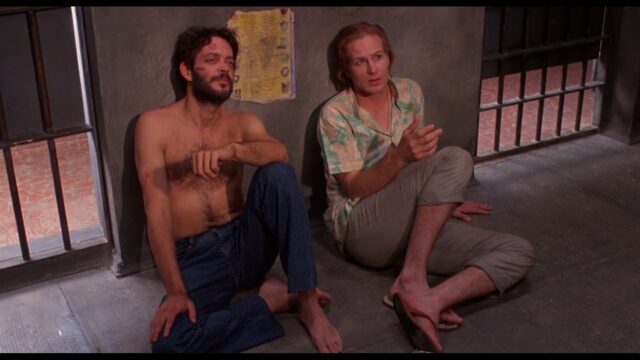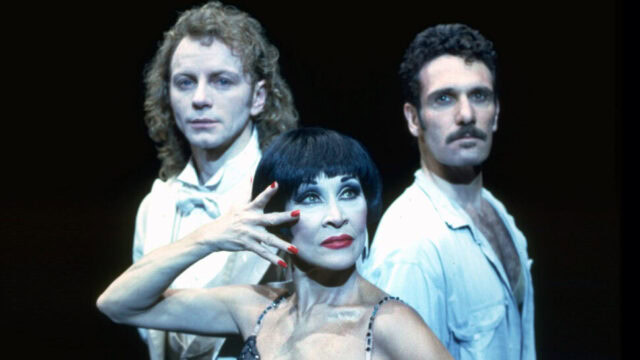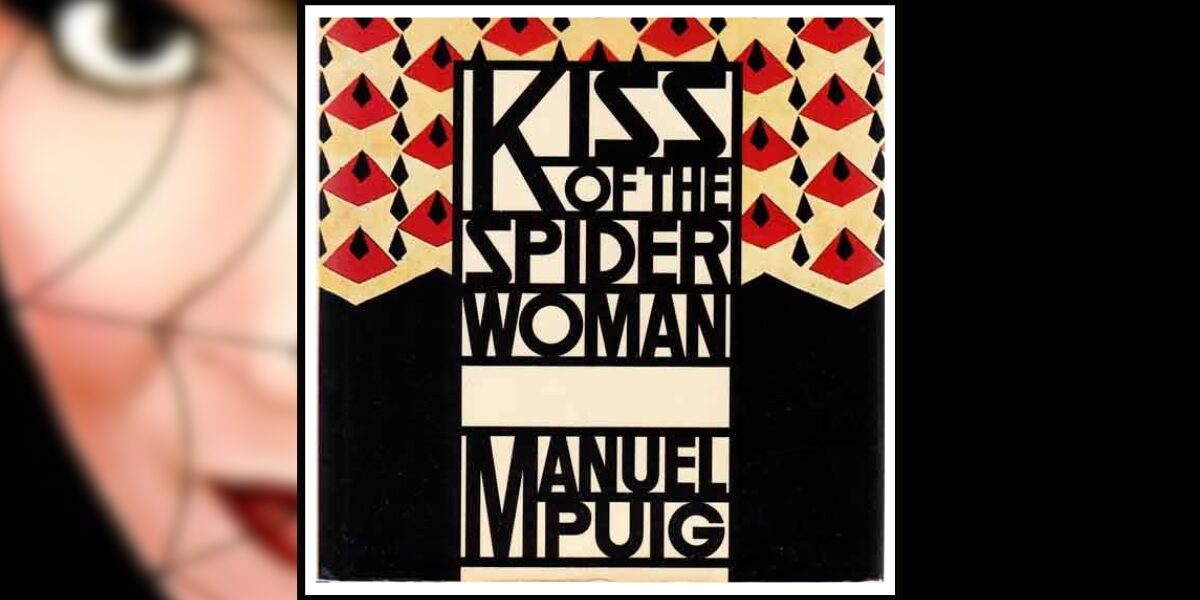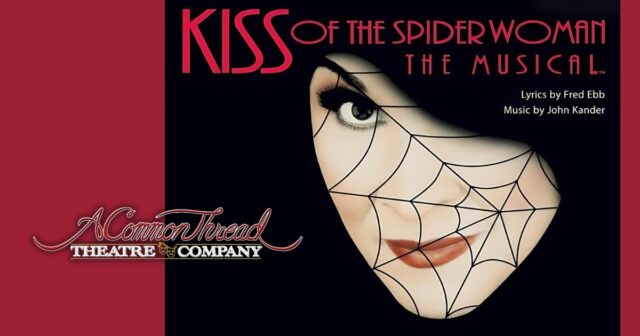A 1970s Argentine prison is one of the last places you’d want to be. Especially if you are gay or a revolutionary, which our two main characters, Molina and Valentin are, respectively. Stuck in a tiny cell all day with little else to do, the two begin to bond. Molina shares his love of movies with Valentin and the two use them as a starting place for many intimate discussions. Manuel Puig gives us an in-depth look at how friendship and love develop under duress in his most famous work, Kiss of the Spider Woman (here translated from Spanish by Thomas Colchie).
[Warning: My review of Kiss of the Spider Woman contains some spoilers!]
Kiss of the Spider Woman is a study in friendship and love
Molina and Valentin are two very different people. Molina is a gay man, Valentin cannot understand that desire (although to his credit, he doesn’t deride Molina for it, just questions him and confesses confusion about it). Valentin is a revolutionary, determined to change his country for the better, and Molina can’t bother to care about anything beyond his own small life. It would seem like these two would have nothing to talk about. But being stuck in a tiny cell together in inhumane conditions can make just about anyone start talking.
And talk they do. While Valentin likes to study all day, when bedtime rolls around it’s understandably difficult to sleep. So, Molina shares his movie obsession to help take their minds off the reality of their situation. Molina recounts his favorite movies aloud in the darkness. Valentin often interrupts to question things or talk about thoughts that Molina’s movies have inspired. Molina gets rather annoyed by these interruptions, but it is during these tangential discussions that their friendship really starts to grow.
As the days pass, their acquaintance becomes a grudging friendship. The grudging friendship gradually becomes a real friendship. And then, to their surprise, that friendship becomes even more. But what does their new relationship mean for both of them? And what will happen when they finally get out of prison if they get out of prison? Kiss of the Spider Woman looks at an often ignored (or else cruelly mocked) situation with a tenderness thoughtfulness that would be surprising in modern times, let alone in the 70s in Argentina. Puig was honestly ahead of his time with this story.

Differences between the Kiss of the Spider Woman musical and the novel
I am sure that there are many small differences between the musical version and the original Kiss of the Spider Woman. I haven’t personally seen the musical version, but I’ve read reviews and summaries of it, and there is one glaringly obvious difference between the two that changes much of the tone of the musical. In the musical version, the spider woman is a character from one of Molina’s movies that he loves so much. And she may or may not actually be in the prison with Molina and Valentin.
But in the book, the spider woman is Molina himself. It is a title that Valentin gives him after the two fall in love, inspired by a character from a movie that they’ve discussed that changes into a panther. It is a more apt name than Valentin realizes, considering Molina is trying to trap Valentin into giving him valuable information on the revolution in a bid to get released from jail. And when Molina becomes trapped in his own web, it becomes even more appropriate.
I think that by changing the spider woman to a different character that is probably just a figment of Molina’s imagination is a bad change. In the book, him being the spider woman is a position of power, he has control as the spider woman. However, in the musical, the spider woman causes him fear. It takes a symbol of power and turns it into a weapon against Molina. It could be argued that being the spider woman leads to his death in the book, and the spider woman is a symbol of death in the musical, so it’s not that big of a change. But I think that taking an internal aspect of the character and making it an external one weakens him and makes his development from a scared pawn to a powerful queen less moving for the viewer.

Kiss of the Spider Woman doesn’t just tackle homosexuality
Molina identifies as gay. But the more he shares with Valentin, I think that he would have identified as transgender in today’s society. He refers to himself as a woman frequently. Indeed, he almost always refers to himself as a female. I think that perhaps in 1970s Argentina, Puig may have had the experience to write about transgender people, but not the terminology, which is why Molina is simply identified as a gay man instead of a transgender female.
I also think that this is why the spider woman was made an external character instead of being Molina when the movie version was created. Writers can often get away with more controversial material than other media because of the (oh boy, don’t get offended) types of minds that tend to be drawn to written media over screen media. While readers could probably stomach the idea of a transgender character, movie audiences in the 1980s wouldn’t be so accepting. The musical was based on the movie, so it kept the change.
Manuel Puig’s book was ahead of its time, but beware the footnotes
Kiss of the Spider Woman is very forward-thinking in some ways. It openly talks about Molina’s homosexuality, and Valentin is surprisingly accepting of it. He never treats Molina as less than because of his sexuality. Even when Molina describes what is most likely transgender desires, Valentin is only curious, not condemning. The whole attitude is very surprising in a book that is nearly fifty years old.
But at the same time, nearly half the book is footnotes. And these footnotes are less than understanding of homosexuality. They mostly contain references to outdated (not as outdated back then, I understand) theories about homosexuality that either label it as a mental illness, a weakness from poor upbringing, or a criminal deviant. While the theories themselves are not surprising in a book so old, they were surprising in a book that is so accepting of homosexuality. I was really upset reading the footnotes and eventually stopped reading them, only concerning myself with the story above. Once I did that I felt much better and if you read a copy with the footnotes I recommend skipping the footnotes completely. No one really needs to read outdated, hateful opinions paraded as fact.
Kiss of the Spider Woman The Musical
It’s not surprising to me that Kiss of the Spider Woman became a stage production. The book’s format is perfectly conducive to adaptation. Puig writes in pure dialogue. Each time there’s a speaker change, it’s noted with a dash. The format very much reminded me of reading a script. There are no stage directions or scene descriptions, though. Every single word is pure dialogue. It was a very different kind of reading experience for me. But I see how it kept the focus on the two characters and how they interacted as their relationship grew.
I mean, there was literally nothing else besides their words to each other. Even private thoughts are missing, making it very reminiscent of a play or movie. However, facial cues and body language are also missing, so it’s hard for the reader to interpret what’s going on at times. Especially during scenes where the words themselves are gone, and it’s just a series of ellipses as the characters are either looking at each other or being intimate. It was probably the safest way to handle those scenes in that time period, but it was annoying for me.
The whole reason I prefer books to movies/plays is the extra details that books give. With those details missing, I was in the dark at times about how to picture Molina’s and Valentin’s interactions or with understanding their intentions. This is very likely one book that I would enjoy more as a performance because at least the actor’s actions and the set would help me to understand what’s going on.
An interesting look at love and friendship behind prison walls
Despite my criticism of Kiss of the Spider Woman, Puig was daringly ahead of his time. He takes an overlooked and sensitive subject and deals with it in an insightful and kind manner. The style is a little difficult, but the story is very interesting. It won’t be for everyone, but true romantics will see the beauty of the story and be entranced.
Rating: 6/10
Kiss of the Spider Woman by Manuel Puig, translated by Thomas Colchie is available wherever books are sold. Let us know your opinion on it on social media @mycosmiccircus.
A Common Thread Theatre Company Presents: ‘Kiss of the Spider Woman The Musical’




